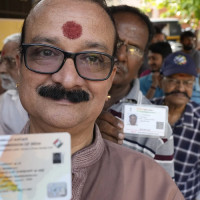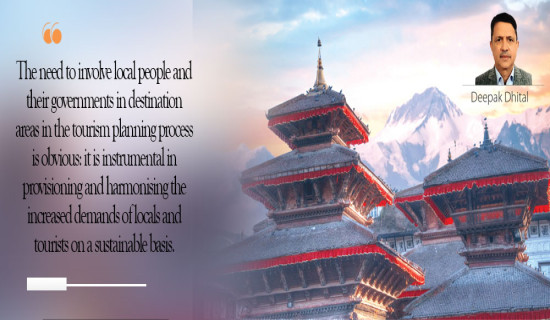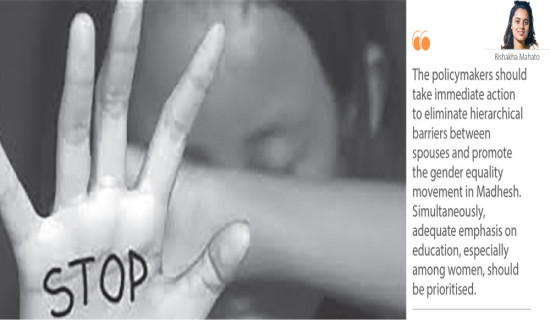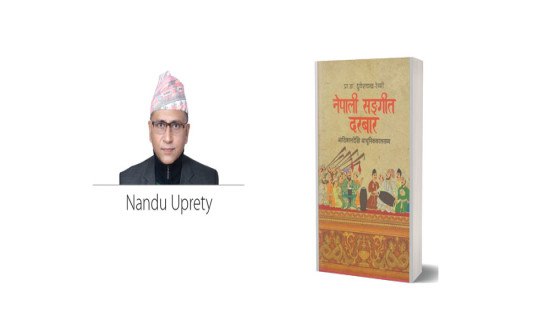- Saturday, 27 April 2024
Sex Among Older People
Tulasi Acharya
The description of sex or sexual activities in the Kamasutra, a sex manual written by Vatsyayana, and ancient Indian philosopher, displays the significance, praise, and power of sex, and its quality relationship with human life.
However, the more significant and praiseworthy sex appears to be the discussion of older people's sexual lives or the sexual lives of people with disabilities.
As people with disabilities are deemed as people with no sexual desire, the sexual desire of older people can be considered the butt of a joke. It is because older people are connected to the idea of people with a disability as they are also deemed to be physically challenging, incapable or feeble.
Without Sexual Desire?
Thus, our society finds older people as disabled who are also without sexual desire. Our society tends to connect physical feebleness with mental, emotional, and psychological feebleness and concludes that older people are without sexual desire.
Robert Mcruer and Anna Mollow's "Sex and Disability," Don Kulick and Jens Rydstrom's "Loneliness and It's opposite," Tom Shakespeare's "The Sexual Politics of Disability," and Michael Gill's "Intellectual Disability and Sexual Agency" discuss the significance of sex and its importance for a quality life of people. However, they discuss how people are parochial and biased at the idea of sex, especially, when it comes to the sex lives of people with disabilities.
Our society also puts older people into the category of people with disabilities and discourages their sexual lives. "It is because our society connects the feebleness of older people with physical incapacities of people with disabilities," says Krishna Murari Gautam, the founding principal of "Ageing Nepal" in Kathmandu, who has been researching and writing about older people for a long time.
In a society that defines people with disabilities as people with no sexual desire, who will realise the importance of sex in the lives of older people? Who will help better understand the significance of sex and its relationship with the quality of life of people?
The significance of sex lies not only in the lives of adults but also does lie in the lives of older people. According to the World Health Organisation (WHO), to be healthy sexually is the stage when the person is completely healthy physically, mentally, emotionally, and socially. When one represses the sexual desire, then it will reduce one's quality and rhythm of life. In the article "Factors Conditioning Sexual Behaviour in Older Adults: A Systematic Review of Qualitative Studies" published in the Clinical Medicine Journal, Cano et al (2020) write that healthy sex is required for the person's complete life experience, especially for those who are fifty or fifty plus.
The article further mentions that sexual activities among the older population are an important part of their quality lives that are related to their mental and physical health while establishing a satisfying relationship in their lives and preventing them from different chronic diseases. If one fails to fulfil sexual needs, one will suffer from depression, pessimism, loneliness, and others, which may cause one to act aberrantly in their behaviour of sexual practices.
There is always a lack of sexual experience among people with disabilities and
older people. It is because either they might have not been living as married couples or
might have lost their partners who they could have sex with.
It is also because society looks down upon the sexual practices among older people and people with disabilities, and, therefore, fails to understand their sexual needs.

No Partners
According to the Census 2022 of Nepal, more than thirty hundred thousand of the population is sixty plus. Among them, some of them are living a life without a partner since they never married or might have lost their partner.
Those who remarried could be men more than women because of the prevalence of our patriarchal society that still looks down upon the widow getting married.
Our society is not open to talking about sex and its significance. In a general survey among people of sixty plus, most of the participants reflected on the parochial patriarchal society that didn't let them, first, talk about sex openly, second their age factor prevented them from talking about sex, and third, sex is defined only in terms of sexual intercourse.
In the article "Sex Life of Older People: Self-Reported Sexual Activity in Australian Sexagenarians," published in Clinical Research Journal, Jason A Ferris, Anthony M A Smith, et al. (2008) write that an active sexual life is very important for a person's good health. In the survey, more than 90 per cent accepted the significance of sex with human health.
Most of the survey
questions asked to the respondents had to do with physical pleasure and physical and emotional satisfaction.
According to health doctors, no matter what the person's age is, sex is always connected to the person's healthy life. In "The Secrets of Life of Older People That Can Make Us Rethink Our Idea of Intimacy,” Sharron Hinchliff (2015)’ points out that those who are older than seventy seem to have had sex more than three times a month while some of them do not even reply due to their coyness.
The article even mentions that those who have had sex seem to have experienced a quality life compared to those who didn’t. In the article “Sex in the Senior Years,” Mark Stibich (2022) writes that many people think that as people get older, they lose sexual interest and desire, and they become less important.
Although there might be some truth in it, the survey was done by the University of Michigan (2017) shows that forty per cent of people from age between 70 to 80 seem to have been in active sexual activities. This shows that there does lie the significance of sex. As people get older there might be some problems, as a few health experts point out, such as taking time for erection
(for men), dryness of the vagina (for women) and so on. However, the biggest hindrances in active sexual activities are the social attitudes towards sex, sex lives of older people, lack of social awareness, deep-rooted social and cultural taboo, and biased social and cultural understanding of sex, some older people explain. In one of the surveys done by Lee, Nazroo, et al. (2016) in Britain shows that 60 per cent are engaged in active sexual activities among 70- to 80-year-old people, and 33 per cent are from 80 to 90 years old.
However, the less are women. And the reason is not that they have no sexual desire, but because they have no opportunity for sex, the study shows. Kalra et al (2012) writes, "Human beings are never too old to enjoy a happy and healthy sex life."
Deeper Relationship
In the article "Sexual Activity Among Seniors: What Is Normal?" published in the Huffington Post (2017), it is mentioned that out of 7000 participants, only 3 per cent didn't want to say anything, but most of them said that they were sexually active even at the age of eighty. In the article "We Slept with Hundreds of People: Three Older Women on Sex and Pleasure" published by the Repeller, Iman Hariri-Kia (2019) writes that sex is an activity between two people that makes their relationship deeper and qualitative."
It is, therefore, to say older people have no sexual desire is an illusion and false. According to Cano et al (2020), there is always sexual desire among older people, and they can utilize it properly.
Cano et al further say that some older people have even better sex lives than when they were adults, especially those who are not under social and familial pressures. This infers that sometimes social and cultural taboos about sex, sexual biases, religious prejudices about sex, and the question of morality regarding sex interfere with the quality of people's sexual lives.
Similarly, in the article “Frequency of Sexual Intercourse Among Residence of Bangladesh, India, and Nepal” published in the Journals of Psychosexual Health, Yasir Arafat et al.(2021) writes about the physical relationship with human health, but we fail to understand that way when it comes to the sexual activities of older people. Especially, in the context of Nepal, if one's partner passes away, we discourage one to remarry, especially if she is a woman, due to the biased social attitudes toward the widow that links to cultural taboo.
Again, if the person is a woman, poor, and from a lower caste, it will be unimaginable for our society to think on behalf of the marginalized ones' sexual needs and desires. The more the person is marginalized, the less one thinks about the person's capacity to have sex.
In the land that sowed the Kamasutra, the same land shies away from the talk of sex. Even the kissing between a husband and wife in public becomes the question of morality, let alone the talk of the Kamasutra. Society looks down upon the talk of sex and sexual needs and human bodily needs.
On the one hand, we have the Kamasutra, a sex manual, and on the other hand, the talk of sex and public participation on the topic is almost unknowingly prohibited. The society that considers sex taboo tells us to forget about the relationship of Vishwamitra and Menaka in the forest and the chiselled-out sexual postures of Gods and Goddesses in the temple.
One should not forget that the significance of sex comes with the quality of life.
Robert Mcruer and Anna Mellow (2012) writes that "Sex and quality of life are interdependent." However, we continue to make this topic taboo and impose our ethos that people with disabilities and older people have almost no sexual desire.
We continue to create such rhetoric that prevents many people from living a quality life while controlling their emotional and psychological aspects of life, and, eventually, create a discourse that encroaches on the biological rights of older people and people with disabilities.
Quality Life
In "History of Sexuality," Michael Foucault (2012) writes that such biased rhetorical discourses prevent us from questioning
authority and seeing things outside the box. We must know sex and its significance in human lives, whether the person is an adult or older or has a disability.
In this context, Tom Shakespeare, the author of "Sexual Politics of Disability" is very open and writes that if those who want sex but are incapable to have it, it will be better to find a sex worker for them so they can fulfil their sexual desire. It is not a question of morality or immorality; it is a question of whether the person is living a quality life or not.
(Acharya holds a PhD in Public Administration and has written a book titled, 'Sex, Gender, and Disability in Nepal')
How did you feel after reading this news?



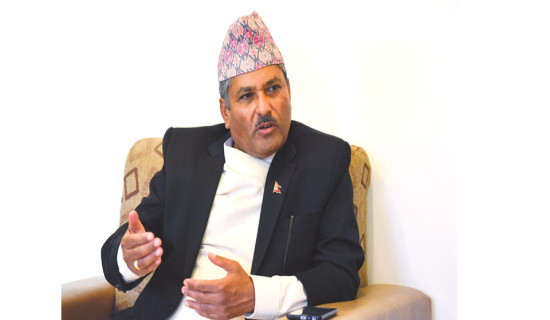

-square-thumb.jpg)


